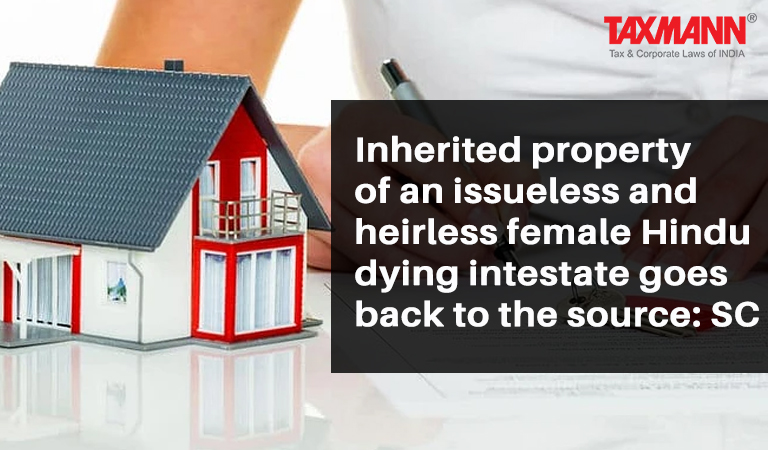Inherited property of an issueless and heirless female Hindu dying intestate goes back to the source: SC
- Blog|News|Company Law|
- 3 Min Read
- By Taxmann
- |
- Last Updated on 25 January, 2022

Case Details: Arunachala Grounder (Dead) Vs. Ponnusamy and Others. - [2022] 134 taxmann.com 232 (SC)[20-01-2022]
Judiciary and Counsel Details
-
- S. Abdul Nazeer and Krishna Murari, JJ.
Facts of the Case
In the instant case the property in question was admittedly the self-acquired property of Marappa Gounder (deceased). The property was purchased through Court auction sale by Mr. Marappa Gounder on 15.12.1938. It was his self-owned property. After his death the property was inherited to his sole surviving daughter Kupayee Ammal. Later on Kupayee Ammal also died issueless in 1967.
There were two question raised by the appellant before the court.
1. Whether late Gounder’s sole surviving daughter Kupayee Ammal, could inherit the same by inheritance and the property shall not devolve by survivorship to father’s brother’s son. (Prior to the enactment of Hindu Succession Act, 1956), as Marappa Gounder died before the commencement of the Act.
2. Another question was regarding the order of succession after the death of such daughter, which was after the enactment of the Hindu Succession Act, 1956.
Supreme Court Held
The Supreme Court held that “If a property of a male Hindu dying intestate is a self-acquired property or obtained in partition of a co-parcenery or a family property, the same would devolve by inheritance and not by survivorship, and a daughter of such a male Hindu would be entitled to inherit such property in preference to other collaterals.”
The Court held that this right is well recognized not only under the old customary Hindu Law but also by various judicial pronouncements. Therefore the property was rightly inherited to Kupayee Ammal.
As far the question regarding the order of succession after the death of Kupayee Ammal is concerned, the Court held that Section 15 & 16 of the Indian Succession Act, 1956 clearly defines that what will be the order of the succession after the death of a female.
The Court held that if a female Hindu dies intestate without leaving any issue, then the property inherited by her from her father or mother would go to the heirs of her father whereas the property inherited from her husband or father-in-law would go to the heirs of the husband.
In case, a female Hindu dies leaving behind her husband or any issue, then Section 15(1)(a) comes into operation and the properties left behind including the properties which she inherited from her parents would devolve simultaneously upon her husband and her issues as provided in Section 15(1)(a) of the Act.
The basic aim of the legislature in enacting Section 15(2) is to ensure that inherited property of a female Hindu dying issueless and intestate, goes back to the source. Section 15(1)(d) provides that failing all heirs of the female specified in Entries (a)-(c), but not until then, all her property howsoever acquired will devolve upon the heirs of the father.
The devolution upon the heirs of the father shall be in the same order if a female Hindu dies intestate without leaving any issue, then the property inherited by her from her father or mother would go to the heirs of her father whereas the property inherited from her husband or father-in-law would go to the heirs of the husband and according to the same rules as would have applied if the property had belonged to the father and he had died intestate in respect thereof immediately after her death.
In the instant case as Kupayee Ammal inherited the property from her father (Late Marappa Gounder), therefore the property will would go to the heirs of her father.
The Court held that late Ramasamy Gounder’s (brother of late Marappa Gounder) daughters being Class-I heirs of their father too shall be heirs and entitled to 1/5th share each in the suit properties
Disclaimer: The content/information published on the website is only for general information of the user and shall not be construed as legal advice. While the Taxmann has exercised reasonable efforts to ensure the veracity of information/content published, Taxmann shall be under no liability in any manner whatsoever for incorrect information, if any.

Taxmann Publications has a dedicated in-house Research & Editorial Team. This team consists of a team of Chartered Accountants, Company Secretaries, and Lawyers. This team works under the guidance and supervision of editor-in-chief Mr Rakesh Bhargava.
The Research and Editorial Team is responsible for developing reliable and accurate content for the readers. The team follows the six-sigma approach to achieve the benchmark of zero error in its publications and research platforms. The team ensures that the following publication guidelines are thoroughly followed while developing the content:
- The statutory material is obtained only from the authorized and reliable sources
- All the latest developments in the judicial and legislative fields are covered
- Prepare the analytical write-ups on current, controversial, and important issues to help the readers to understand the concept and its implications
- Every content published by Taxmann is complete, accurate and lucid
- All evidence-based statements are supported with proper reference to Section, Circular No., Notification No. or citations
- The golden rules of grammar, style and consistency are thoroughly followed
- Font and size that’s easy to read and remain consistent across all imprint and digital publications are applied



 CA | CS | CMA
CA | CS | CMA
